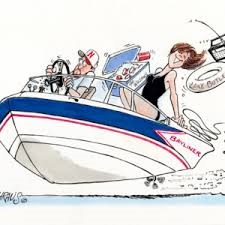Safety in recreational boating
Dear professionals
It has been a while since I have been thinking of writing something in the wake of the recent recreational boat accident that took away the lives of many . When it comes to ensuring safety while on a recreational boat, there are several important checks that you as a passenger can do by yourself.
1. Check for the registration mark assigned to a Vessel such as registration number, port of registry and name of Vessel shall be displayed on both sides of the vessel. Registration number is allotted to a vessel only after mandatory checks.
2. In addition to the identification marks, every vessel shall be painted and displayed on a fixed board, exhibited on the upper deck, the following information;
a) gross registered tonnage ;
b) maximum permissible number of passengers ;
c) name of the owner ;
d) date of last survey/ date of next survey.
3. The Owner or Master shall ensure that life saving devices like life buoys, life jackets, life raft (for larger sized vessels), emergency lights, torches, fire extinguishers, first-aid kits etc as required are available and are kept in such a position for quick deployment in case of emergency; At minimum you can check if all these life saving devices can together accommodate the entire passengers in the boat in case of emergency. If passengers include children, then the life saving devices that can protect children to be made available in the boat too.
4. Safety Briefing: Listen carefully to the safety briefing provided by the boat operator before departure. Pay attention to emergency procedures, location of life jackets, and other safety equipment. If the master of the boat does not provide a proper briefing ask for it, if not you always have the right to refuse to enter the boat.
5. Weather Conditions: Before boarding the boat, check the weather forecast to ensure that conditions are suitable for boating. Avoid going out on the water during storms, high winds, or other adverse weather conditions.
6. Boat Condition: Assess the overall condition of the boat before boarding. Look for any visible signs of damage, such as cracks, leaks, or loose fittings. Report any concerns to the boat operator, if you don’t feel comfortable with the condition of the boat, you have the right to refuse to enter the boat.
7. Emergency Contacts: Have the necessary emergency contact numbers readily available, such as the local coast guard or marine police. Keep your mobile phone or a communication device with you in case you need to call for help.
8. Stay Seated: Once on board, always remain seated while the boat is in motion. Avoid unnecessary movement that could lead to accidents or falling overboard.
9. Follow Instructions: Obey the instructions given by the boat operator or crew from time to time. They are responsible for your safety and are knowledgeable about boating procedures and regulations.
10. Alcohol and Drugs: Avoid consuming alcohol or using drugs before or during your boat trip. These substances can impair judgment, coordination, and reaction time, increasing the risk of accidents.
Remember, your safety is paramount while on a recreational boat. If you have any concerns about the boat or your safety, communicate them to the boat operator or consider finding an alternative vessel. Staying silent is a disease.


Comments
Post a Comment